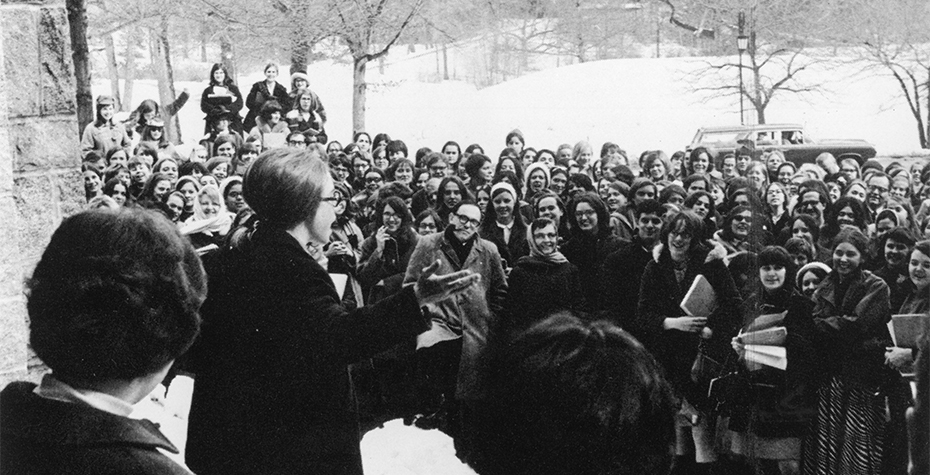2016 Postmortem
Related: About this forumFirst Time Hillary Was President
Michael Kruse ?@michaelkruse Aug 26 Davidson, NC
I wrote about @HillaryClinton at @Wellesley.
Hillary Rodham on campus. | Wellesley College Archives
____ Clinton has called the four years she spent on the secluded campus in this staid suburb of Boston “among the most exhilarating and informative of my life.” The most popular storyline from her college career is her shift from right to left on the ideological spectrum, but lots of her peers made the same transition. Much more telling, and what emerges from a close look at her role as a leader at Wellesley, is the way she ended up occupying an almost singular role in the school’s political life. During a period of immense social upheaval, she was the most prominent intermediary between her increasingly radicalized fellow students and a change-resistant faculty and administration. “Hillary tended always to be what I will call a consensus person,” classmate Connie Hoenk Shapiro told me.
The college’s archives, including seldom seen notes of hers, minutes of student government meetings and coverage in the student newspaper and other campus publications, as well as interviews with the professors with whom she was closest and more than a dozen of her classmates and contemporaries, reveal a strikingly clear picture of the political personality that has defined the Democratic presidential nominee ever since: centrist, cautious, respectful of authority, progressive but never at the expense of maintaining access to the seats of power.
"Hillary tended always to be what I will call a consensus person,” classmate Connie Hoenk Shapiro said. Above, Hillary Rodham participates in a panel. | Wellesley College Archives
As she climbed the ranks of college government, from class representative to the student senate as a sophomore to chairman of the “Vil Juniors” organization and finally to student body president, she favored teach-ins over sit-ins, talking over chanting, symposia over sign-waving. She led successful initiatives that look somewhat small-bore now but felt like big deals then—convincing the college to all but eliminate antiquated curfew regulations and rules about when men from surrounding colleges could (and mostly could not) visit their dorms, getting students more latitude in choosing courses and earning them the right to take some of them pass-fail. She also was supportive of a committed group of black students who pressured the administration to agree to admit more black students, hire more black professors, institute a black studies program and end segregated room assignments. And she did these things by not only listening to the concerns of fellow students but by forging relationships with professors, deans and a college president whom those same students saw as a stodgy obstacle to change.

Hillary Rodham speaking at rally at Wellesley College | Wellesley College Archives
The academic year that had started with her speech to the freshmen ended with a different speech on the last day of May—the much-more-written-about one that she gave at graduation, to her classmates and their parents, professors and administrators, and a sitting Republican U.S. senator whose remarks she gently rebuked with her own off-the-cuff thoughts. It was sufficiently noteworthy to land her in the pages of Life magazine—tapped as a bold voice of a new generation—and in the last quarter-century, from her time as First Lady and then in the Senate to her stint as Secretary of State, it has come to represent a public consummation of her turn from supporting ultra-conservative Republican presidential candidate Barry Goldwater in 1964 to volunteering for Democratic hopeful Eugene McCarthy in 1968 as a more outspoken liberal.
The graduation speech offered a largely progressive message, but she delivered it in language that was far from incendiary, more of a manifesto of moderation than a revolutionary’s battle cry. She talked about “constructive protest.” She noted a “conservative strain that goes through a lot of New Left.” And, as if there was any doubt she was addressing an elite, educated crowd, she invoked a poem by T.S. Eliot, “East Coker.” She had excerpted the poem, in fact, more extensively at the beginning of the 92-page thesis she had turned in earlier that month—about Saul Alinsky, the countercultural community organizer and later a punching bag of conservative commentators. The thrust of the thesis was what Rodham viewed as the inherent limits of radical activism, and among the many resonant lines of Eliot’s work, one stands out for its applicability to the ambitious young woman who was speaking in the graduation gown: “So here I am, in the middle way …”
read more: http://www.politico.com/magazine/story/2016/08/hillary-clinton-2016-wellesley-president-214188
Hillary Rodham at a Wellesley student rally in October 1968. | Wellesley College Archives
lillypaddle
(9,580 posts)bigtree
(85,996 posts)...paved by her influential mom and countless others.
lillypaddle
(9,580 posts)But there should be no doubt that she has worked her butt off almost her entire adult life.